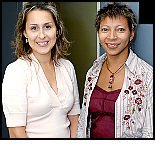
From The New York Daily News…
--------------------------------------------------------
Voces Latinas gives women with HIV voice
By Clem Richardson
Rosa Bramble Weed and Nathaly Rubio-Torio are getting immigrant Latinas to talk.
They’ve heard some amazing stories, been able to reconnect themselves with their heritage, and done a lot of good to boot.
Weed and Rubio-Torio are founders of Voces Latinas, a Woodside, Queens, program aimed at curbing the rate of HIV and AIDS infections among immigrant Latinas in the city.
Once a week, women from countries across South America, many of them living with HIV and AIDS, gather at Voces Latinas’ office to talk.
“They talk about their lives, what they left behind in their home countries, how they got infected, what life is like here,” said Rubio-Torio.
That is a welcome relief for many women living with the disease.
It’s not easy.
Latina women with HIV struggle to keep their illnesses secret. That means many are in the later stages of the disease, or have developed full-blown AIDS before they seek treatment.
“This is a very difficult population to reach because of the stigma HIV and AIDS carries in our community,” Rubio-Torio said. “It makes it more difficult to give them the information they need.”
The stigma makes Weed and Rubio-Torio’s jobs that much more difficult. Even when they want the information, women are often reluctant to be seen taking pamphlets for fear people will think they have the virus. “It makes handing out the literature difficult at times,” Rubio-Torio said.
When Voces Latinas had a news crew attend one of its meetings, many of the women, alerted beforehand, showed up wearing disguises.
There is an urgent need for Voces Latinas services.
HIV and AIDS are at “crisis” levels in minority communities, Weed said.
“When you look at the numbers of people who have been most recently infected, they’re mostly Hispanic and African-American,” she said. “The numbers aren’t stagnant; they’re increasing.”
African-Americans and Hispanics make up the majority of new HIV and AIDS cases in the city, according to city Department of Health and Mental Hygiene statistics. The percentage of women and young people contracting the disease through heterosexual sex continues to skyrocket, making women one of the most at-risk groups for HIV infection.
Weed and Rubio-Torio said many Voces members contract HIV from their partners, many of whom don’t know they have the disease. Other women may know their partner is HIV-positive, but are unable to get him to wear a condom - and, in homes with domestic violence, cannot safely refuse to have sex if he doesn’t wear one.
“One woman who comes to Voces keeps checking her watch because she has a curfew,” Weed said. “You can see she is afraid of what will happen if she misses it.”
Immigrant Latinas, especially those in the country illegally - Voces Latinas’ core group - often have no idea how to access the realm of services available to people with HIV or AIDS. Many face language barriers, think they have to pay for treatment, or fear they will be deported if their immigration status is revealed while they are being treated.
None of that is true.
Voces helps women access the services they need to treat their HIV/AIDS. Just as importantly, Rubio-Torio said, “This is the place where they can come and get the information they need. It’s a safe place to talk, and to find the support they need. It’s therapeutic for them to be here.”
“We’re telling them they have a choice,” Weed said. “For many of them, coming here is the first time they feel like they are not alone, that together they can make themselves be heard.”
Weed and Rubio-Torio both hold master’s degrees in social work - Weed from Hunter College, Rubio-Torio from Columbia University. Both work full-time jobs and don’t draw a salary for their work with Voces, which won them a 2005 Union Square Award.
Weed immigrated to the U.S. from Venezuela when she was 7 years old. Rubio-Torio was 3 when her veterinarian father, Sergio, came to the U.S. because “a friend told him that Americans would do anything for their pets.”
Weed’s family - father, Ivan, an electrician, and mother, Dora, a businesswoman - settled in the South Bronx, where they immersed themselves in Puerto Rican culture.
Rubio-Torio’s father, Sergio Rubio, and mother, Carmen, settled in Elmhurst, Queens, but would, over the years, moved to Minnesota and places in the West before returning to the city for schooling.
The two worked for a variety of social service agencies across the city, including Covenant House (Rubio-Torio) and the Woman’s Health Alliance (Weed).
Weed now directs the Positive Life Program of the Child Center of New York, based in Woodside. Rubio-Torio is a fellow in New York University’s Robert F. Wagner Graduate School of Public Service.
The two met in 1999 while coordinating an AIDS education forum as part of the Western Queens HIV Care Network, a group that no longer exists. They formed Voces shortly afterward, having seen how HIV was devastating immigrant women.
Rubio-Torio said her work has given her even more appreciation for her Latin heritage.
“I was a little mixed up about who I was and where I was from when I was growing up,” she said. “We were usually the only Hispanics in our neighborhood. This work has really helped me get in touch with my roots.”
For information about Voces Latinas, call (516) 322-1959 or (718) 593-4528 or check their Web site, www.voceslatinas.org.

No comments:
Post a Comment